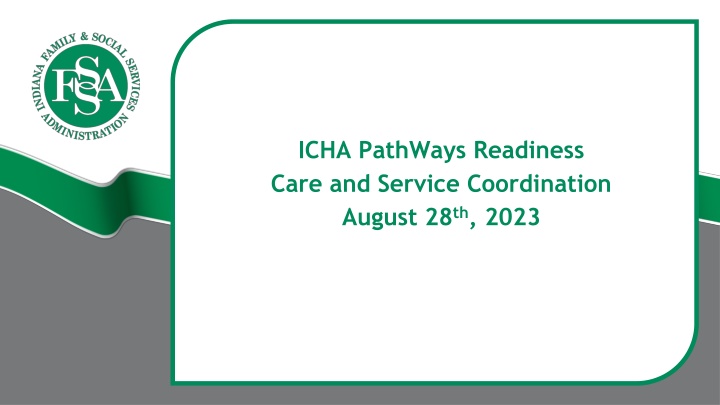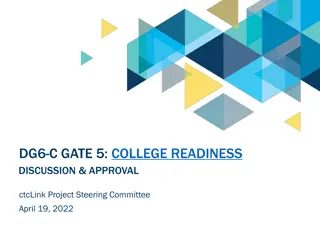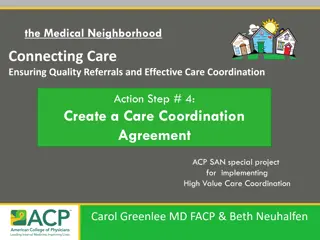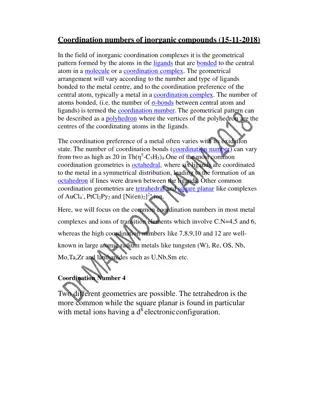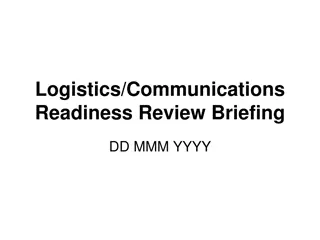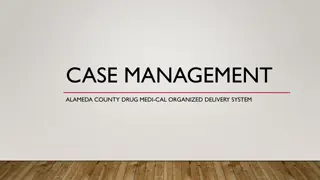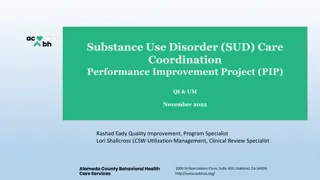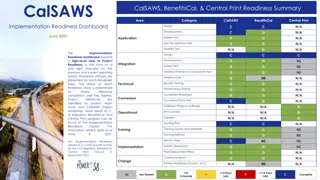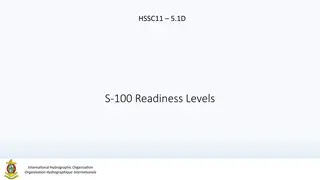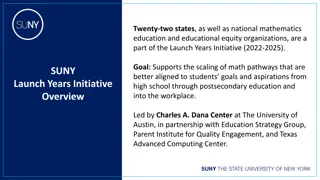ICHA PathWays Readiness Care and Service Coordination
The document outlines the roles, responsibilities, and collaboration expectations for care and service coordinators within healthcare facilities. It includes detailed discussions on care planning, interdisciplinary teamwork, communication with residents, and resolution processes. Emphasis is placed on supporting members in accessing long-term services, medical care, and social services, along with the importance of care coordination for improved quality and continuity of care.
Download Presentation

Please find below an Image/Link to download the presentation.
The content on the website is provided AS IS for your information and personal use only. It may not be sold, licensed, or shared on other websites without obtaining consent from the author.If you encounter any issues during the download, it is possible that the publisher has removed the file from their server.
You are allowed to download the files provided on this website for personal or commercial use, subject to the condition that they are used lawfully. All files are the property of their respective owners.
The content on the website is provided AS IS for your information and personal use only. It may not be sold, licensed, or shared on other websites without obtaining consent from the author.
E N D
Presentation Transcript
ICHA PathWays Readiness Care and Service Coordination August 28th, 2023
Agenda Item Topic Presenter/Facilitator Time 1 Review of Care & Service Coordinator Roles & Responsibilities, Interactions, and General Staffing Requirements based on the State s Vision, Scope of Work, and Manual Darcy Tower 60 min 2 Discussion Darcy Tower and NFs and ALs 30 min a) Based on the SOW requirements, how do you envision care and service coordinators collaborating with NF/AL staff and operating within your facility s interdisciplinary team? How do you expect this role to operate in care planning meetings with facility staff? How do you expect facility staff and service coordinators to collaborate in communication with residents (discussing goals, etc.)? If there is a disagreement between facility staff and MCE service coordinator related to care planning, what are your expectations for the resolution process? How do you envision collaboration during resident transitions (into and out of facility)? b) What opportunities do you see for incorporating a care and service coordinator from MCEs? c) What do you want to avoid in the relationship between care/service coordinator and facility staff? 3 Action Items Darcy Tower 30 min 2
Scope Requirements - Service Coordination & Care Coordination Care Coordination Service Coordination Service Coordination specifically focuses on supporting members in accessing long-term services and support, medical, social, housing, educational, and other services, regardless of the services funding sources. (SoW Section 4.1) Care Coordination reflective of their needs to assist them in planning, accessing, and managing their health care and health care-related services. (SoW Section 4.1) All members regardless of their assigned Care Coordination level of service must have an assigned Care Coordinator to facilitate the development of a longitudinal and trusting relationship with each member toward improved quality, continuity and coordination of care. (SoW Section 4.1) All members with a Nursing Facility level of Care (HCBS or institutional) will receive service coordination for their LTSS and related environmental and social service. (SoW Section 4.1) 3
PathWays Care Coordination Complex Case Management (4.2.2) Includes all care management services and active coordination of care and services with the member and their provider. Includes comprehensive health assessment. Care Management (4.2.1) Foundational component of program and intended to provide members with care coordination activity assistance, etc. Assists members in improving health outcomes. Complex Case Management + Service Coordination (4.2.3) Includes complex case management & service coordination, defined as process of assessment, discovery, planning, facilitation, advocacy, collaboration, and monitoring of the holistic LTSS and related environmental and social needs. Provided by Care Coordinator. Provided by Care Coordinator. Provided by Care Coordinator & Service Coordinator Team. For members who have a higher acuity. See list of conditions in Scope of Work. For members with lower acuity. For members who have a higher acuity and have a NFLOC. Example: Member has diabetes that is under control and high blood pressure. No NFLOC. Example: Diabetes is uncontrolled and an active cancer diagnosis. No NFLOC. Example: Member has Alzheimer's, is wheelchair bound and enrolled in the PathWays HCBS Waiver. Determined by acuity & presence/absence of NFLOC 4
PathWays Scope Requirements Care Coordination Program On an annual basis, each MCE will submit to FSSA a comprehensive Care Coordination Program Plan for review and approval (SoW Section 4.1). Elements of the Care Coordination Program Plan include, but are not limited to the following: Critical care and service coordination elements such as: care coordination staff structure, comprehensive health assessments, individualized care plan (ICP), interdisciplinary care team (ICT), continuity of care and transitions (SoW Section 4.1) Evidence of person-centered practices ideally from a strengths-based approach (SoW Section 4.1) How it compliments D-SNP Model of Care (SoW Section 4.1) Explain how the MCE will provide age-friendly, person-centered, integrated care that is aligned among Medicaid, Medicare, providers, members, and their caregivers. How the MCE will address Social Determinants of Health (SDOH) needs among the PathWays population. Detailed explanation on how the MCE will identify and support informal caregivers. Plan for collaboration and alignment with local Area Agencies on Aging (AAAs). Stratification methodology and description of each available level of Care Coordination. (SoW Section 4.2) Right Choices Program (RCP) policies and processes, and how the RCP will align with Care and Service Coordination (SoW Section 4.2.4) 5
Care Coordinator & Service Coordinator Roles Overview Care Coordinator Available to all Indiana PathWays members Service Coordinator Available only to Indiana PathWays for Aging members who are determined NFLOC and are receiving LTSS Required for members who are determined NFLOC and are receiving HCBS Supplements, but does not supplant, the roles and responsibilities of the Care Coordinator. Collaborates heavily with the Care Coordinator and focuses primarily on waiver- specific services available to the member. Primary writer of the Service Plan, which must be incorporated into the ICP Conducts the monthly loneliness assessment, quarterly needs assessment, annual informal caregiver assessment, and nursing facility assessments (if applicable). Members are able to opt-out Primary responsibility for coordination of the member s physical and behavioral health Primary writer of the ICP For members in NFs, assesses at least annually the member s potential for an interest in transition to the community. MCEs ensure that the member s Service Coordinator and ICT are provided with all CHAT and Care Coordination assessment results applicable to LTSS-specific Service Coordination to inform Service Planning and prevent the need for the administration of duplicative assessments (SoW Section 4.6) The Care Coordinator and Service Coordinator work together to review and modify the Service Plan with the member, their caregivers, and the member s ICT. The Care Coordinator and Service Coordinator will meet together annually with the member to conduct the CHAT reassessment, submit results to the entit(ies) responsible for LOC reassessment, update the ICP, and complete any other assessments based on the member s needs (SoW Section 4.7). Stars throughout the presentation signal collaboration points between care coordinators and service coordinators 6
Scope Requirements - Service Coordinator & Care Coordinator Service Coordinator (SC) Care Coordinator (CC) SoW 4.11.2 Complex Case Management Member Outreach and Contact SoW 4.11.3 Service Coordination HCBS Minimum Contacts HCBS members shall be contacted by their Service Coordinator at least monthly either in person or by telephone unless the member specifically requests to opt out or otherwise reduce the frequency of these monthly contacts. Non-NFLOC members shall be contacted by their Care Coordinator monthly either face to face or by telephone unless the member specifically requests to opt out or otherwise reduce the frequency of these contacts. The Service Coordinator may also meet more frequently with the member when appropriate based on the member's needs and/or request. For NFLOC members who also receive monthly Service Coordination contacts, Care Coordinators may contact such members less frequently, but no less than once every three months or according to the members preferences. Choice of contact frequency captured in the Service Plan Responsible for documenting evidence of any-and-all communications. Choice of contact frequency must be captured in ICP. Leads the Interdisciplinary Care Team. The expectation is the Care and Service Coordinators are communicating. The Care Coordinator shall be responsible for communicating and coordinating with the member s Service Coordinator between Care Coordination contacts regarding any updates to member s status, needs, and/or preferences that are discovered during Service Coordination contacts. 7
Care Coordinator and Service Coordinator Contact Requirements Continued Summarized as follows; ongoing requirements after initial development of ICP & Service Plan: Care Management (SoW Section 4.11.1) Care Coordinator will contact at least once every three months. Complex Case Management (SoW Section 4.11.2) For those members receiving complex case management and not service coordination (non-NFLOC), meet in- person at least once per year and be contacted monthly unless those members opt out or otherwise reduce the contact frequency. For NFLOC members receiving Service Coordination, the Care Coordinator may contact them less frequently than monthly, but no less than once every three months or according to the member's preferences. The Care Coordinator is responsible for communicating and coordinating with the member s Service Coordinator regarding updates to member s status, needs, and/or preferences. Service Coordinator and Care Coordinator will meet at least annually in-person with the member to conduct the CHAT and update ICP and Service Plan. (CC Program Manual Section 10.3) Service Coordinator (SoW Section 4.11.3 and 4.11.4) For members in HCBS: Face-to-face 90 days from initial service plan activation and quarterly thereafter. Must also call within 30 days from initial service plan activation and also contact monthly. May meet more frequently based on member s needs. For members in NF: see next slide See Scope of Work Section 4.11 for additional detail 8
Scope Requirements - SC and CC Collaboration in Nursing Facilities and Transitions Service Coordinators shall visit the members in person once per quarter. The Service Coordinator shall communicate as needed with the member s Care Coordinator to address any changing or emerging medical needs of the member. (SoW Section 4.11.4) Care Coordinator and Service Coordinator shall meet together with the member on-site at least once per year to conduct any needed reassessment/reassessment components, exclusive of the LOC assessment, review and update the member s plan of care, and evaluate the member s ability and/or desire to transition. (SoW Section 4.11.4) For members who have the ability and desire to discharge to HCBS, the Care Coordinator and Service Coordinator must coordinate to transition the member to a home or community-based setting. (SoW Section 4.11.4) For members who are transitioning from the home or community into a nursing facility, the member s Care Coordinator shall conduct an on-site visit within ten (10) days of transition to review and update the member s plan of care and to establish a schedule for ongoing Care Coordinator and Service Coordinator contact with the member. (SoW Section 4.12) The member s Service Coordinator and Care Coordinator must participate in the member s Transition Team. (SoW Section 4.12.1) MCEs have the option to determine whether to subcontract service coordination in nursing facility settings. 9
Discussion a) Based on the SOW requirements, how do you envision care and service coordinators collaborating with NF/AL staff and operating within your facility s interdisciplinary team? How do you expect this role to operate in care planning meetings with facility staff? How do you expect facility staff and service coordinators to collaborate in communication with residents (discussing goals, etc.)? If there is a disagreement between facility staff and MCE service coordinator related to care planning, what are your expectations for the resolution process? How do you envision collaboration during resident transitions (into and out of facility)? b) What opportunities do you see for incorporating a care and service coordinator from MCEs? c) What do you want to avoid in the relationship between care/service coordinator and facility staff? 10
Next Steps Future Meeting Schedule November: Prior authorization and care/service coordinator s role as well as Maximus December: Walk through continuity of care in transitions and care/service coordinator s role as well as provider role January: AL/NF feedback on abrasion to successfully submit a clean claim February and March: Claims Testing 11
Appendix 12
FSSA Vision for Service Coordination Service Coordination in PathWays Service Coordination is a process of assessment, discovery, planning, facilitation, advocacy, collaboration, and monitoring of the holistic LTSS and related environmental and social needs of each individual. (SoW Section 4.2) All members with a Nursing Facility level of Care (HCBS or institutional) will receive service coordination for their LTSS and related environmental and social service. (SoW Section 4.1). Service coordination is foundational to the delivery of LTSS in PathWays. Service Coordination specifically focuses on supporting members in accessing long-term services and support, medical, social, housing, educational, and other services, regardless of the services funding sources. (SoW Section 4.1) For the first 2 years of the PathWays program, MCEs shall provide Service Coordination to at least 50% of its enrolled members receiving HCBS waiver services through current Aged & Disabled waiver care management entities such as AAAs and other ICMs PathWays plans must deliver care and service coordination with person-centered practices and they are strongly encouraged to use a strengths-based approach (SoW Section 4.1) 13
PathWays Scope Requirements Service Coordination Service Coordination All members with a Nursing Facility level of Care (HCBS or institutional) will receive service coordination for their LTSS and related environmental and social service. (SoW Section 4.1). Service coordination is foundational to the delivery of LTSS in PathWays. Service Coordination specifically focuses on supporting members in accessing long-term services and support, medical, social, housing, educational, and other services, regardless of the services funding sources. (SoW Section 4.1) For the first 2 years of the PathWays program, MCEs shall provide Service Coordination to at least 50% of its enrolled members receiving HCBS waiver services through current Aged & Disabled waiver care management entities such as AAAs and other ICMs PathWays plans must deliver care and service coordination with person-centered practices and they are strongly encouraged to use a strengths-based approach (SoW Section 4.1) 14
Scope and Manual Requirements - Complex Case Management Scope of Work Manual (Section 7.2) 7.2. Complex Case Management and Service Coordination Members who are determined eligible for complex case management and who are determined NFLOC and receive LTSS are required to receive LTSS-specific service coordination. In these cases, members have both an assigned Care Coordinator and an assigned Service Coordinator. 4.11.2 Complex Case Management Member Outreach and Contact The Contractor may use Service Coordinators and community health workers, to physically make contact when members cannot be reached via telephone within a predetermined, State approved timeframe. The two coordinators are required to collaborate and work together to jointly ensure that the members needs are defined and met. The Service Coordinator is responsible for regular review and modification of the member s LTSS-specific Service Plan and to share this with the member s Care Coordinator. A single individual may serve as both a member s Care Coordinator and Service Coordinator 15
Care Coordinator Requirements Care Coordinators Shall be located in Indiana and licensed as applicable in Indiana. Care Coordinators must be 1. Registered nurses in good standing 2. Have a Master s degree in social work 3. Possess a bachelor s degree in social work, psychology, special education, or counseling, and have at least a minimum of one (1) years of experience in providing case management services to individuals who are older adults and/or individuals with physical or developmental disabilities and/or individuals determined to have a serious mental illness (SMI), 4. OR be a licensed practical nurse (LPN) with a minimum of three years of clinical experience with older adults. A portion of the Contractor s Care Coordinators shall have experience in behavioral health so that they may appropriately assist members with behavioral health conditions. (SoW Section 2.4.3) 16
Service Coordinator Requirements Service Coordinators The Contractor shall employ service coordinators located in Indiana. Service coordinators may be An individual continuously employed as a care manager by an AAA since June 30, 2018 OR a registered nurse, a licensed practical nurse, or an associate s degree in nursing with at least one (1) year of experience serving the program population OR a Bachelor's degree in Social Work, Psychology, Counseling, Gerontology, Nursing or Health & Human Services OR A Bachelor s degree in any field with a minimum of two years full-time, direct service experience with older adults or persons with disabilities (this experience includes assessment, care plan development, and monitoring) OR A Master's degree in Social Work, Psychology, Counseling, Gerontology, Nursing or Health & Human Services OR An Associate s degree in any field with a minimum of four year full-time, direct service experience with older adults or persons with disabilities (this experience includes assessment, care plan development, and monitoring). (SoW Section 2.4.3) 17
